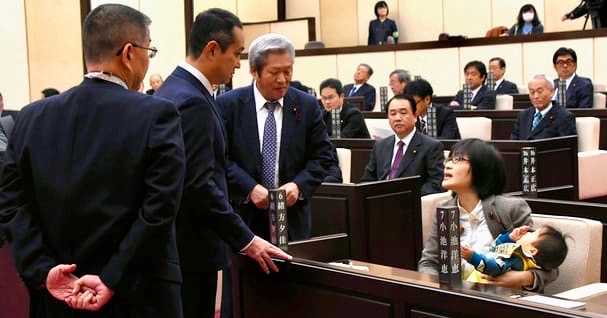TOKYO (excerpted, courtesy of the Washington Post) — Yuka Ogata wanted to make a point about the challenges working women face in Japan. The men on the Kumamoto Municipal Assembly proved her point for her — entirely inadvertently.
The 42-year-old assembly member, on her first day back at work after giving birth, walked into the chamber Wednesday and sat in her front-row seat with her 7-month-old baby, Dogen, in her arms. Video from the assembly session showed the boy sitting on her lap and watching the goings-on, not making a sound, while the men in the other rows looked on in consternation.
Ogata had hardly sat down before four men, including Chairman Yoshitomo Sawada, confronted her about bringing the baby into the chamber. A fifth man lingered behind them.
There, in one camera frame — working moms versus the patriarchy.
“I wanted to appear in the assembly hall with my baby and represent the voices of mothers, working and nonworking, who tell me they’re struggling to raise a child in Japan,” Ogata told The Washington Post. “Women want to be able to raise a child and work happily without having to sacrifice one of these things.” Ogata, who holds a master’s degree in conflict resolution from George Mason University, also has a 4-year-old daughter.
Other politicians around the world have made the point in similar ways.
Licia Ronzulli, an Italian member of the European Parliament, has been taking her daughter, Vittoria, into the chamber in Strasbourg, France, since 2010, when she was 1 month old.
Earlier this year, Larissa Waters became the first member of Australia’s Parliament to take advantage of new rules allowing mothers to nurse their babies in the chamber.
But Ogata’s move set up a serious confrontation in etiquette-bound Japan, where rules are rules and shall not be bent.
Ogata, who was elected to the assembly in April 2015, had already made history — and waves — in March when she remained seated while asking questions in the assembly. She was eight months pregnant at the time.
Her actions illustrate the barriers that Prime Minister Shinzo Abe must break down if he is to achieve his “womenomics” goal — increasing women’s participation in the Japanese workforce as the country’s population shrinks.
Babies are not explicitly banned from the assembly chamber, and Ogata said she had asked the assembly secretariat to allow members to bring their children onto the floor or open a day-care center in the assembly building.
Her request was not without precedent. The Kyoto and Akita prefectural assemblies have child-care facilities in their buildings.
But her request was denied — she was told that attending a meeting with a child would “obstruct the operation of the assembly” — so she decided to take her baby with her when she returned to work anyway. Still, she was surprised to have the infant ejected from the chamber.
The assembly secretariat ruled that the baby was a visitor — and visitors must sit in the gallery.
“The assembly has a rule that only members can enter the assembly hall, so that’s why we asked her to remove her child,” Sawada, the assembly chairman, told The Post. “It wasn’t appropriate.”
The session started 40 minutes late after Ogata asked to accompany Sawada, with her baby, to his office to discuss the matter. Ogata returned — alone. The baby was with a friend.
Sawada opened the session by apologizing to the assembly members for the delay. One of them could be heard replying, “You’re not the one who should be apologizing,” according to local reports.
Politics is a difficult profession for women in Japan. Only 10 percent of the lawmakers in the lower house of the National Diet are women, and little, if any, consideration is given to accommodating mothers.
Megumi Kaneko, then-vice minister of internal affairs, was sharply criticized earlier this year when tabloid papers reported that she was taking her 1-year-old son to day care in her official vehicle. It didn’t matter that the day-care center was in the same building as her Diet office. Newspapers accused her of using an official vehicle for private purposes.
Kaneko apologized to anyone who felt “uncomfortable” with her efforts to find the right work-life balance. She lost her seat in last month’s parliamentary elections.
Ogata was not deterred by this week’s events. She is determined to make Japanese society accommodate working mothers.
“The whole reason why it’s so difficult to raise a child and have a career in Japan is because there are no women with children involved in the decision-making process,” she said. “I’m determined to change that.”
—
Many thanks to Anna Fifield is The Post’s bureau chief in Tokyo, focusing on Japan and the Koreas. She previously reported for the Financial Times from Washington DC, Seoul, Sydney, London and from across the Middle East.Follow @annafifield

